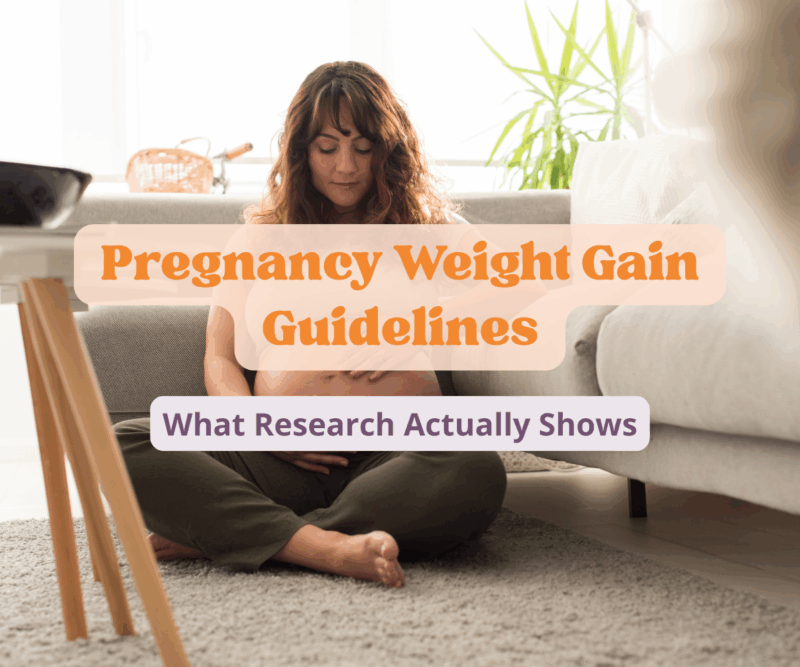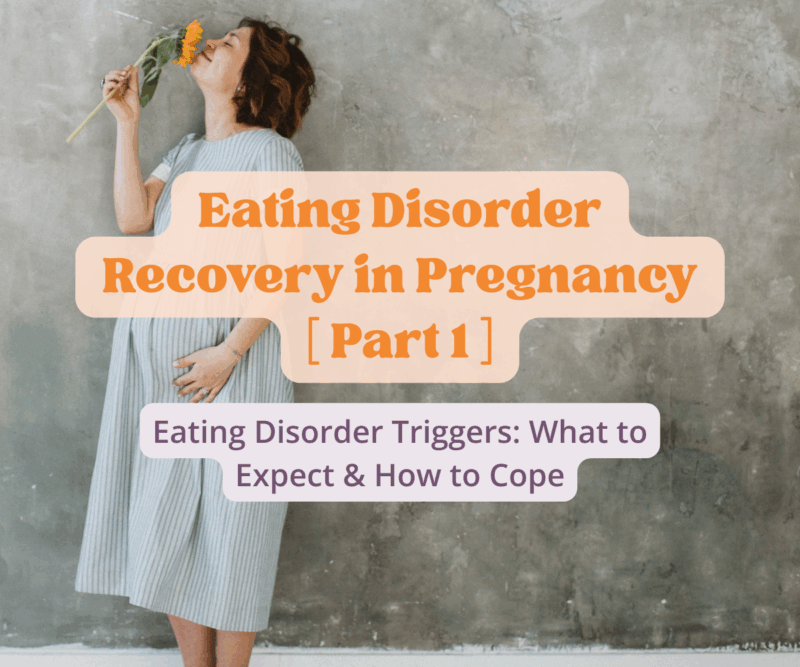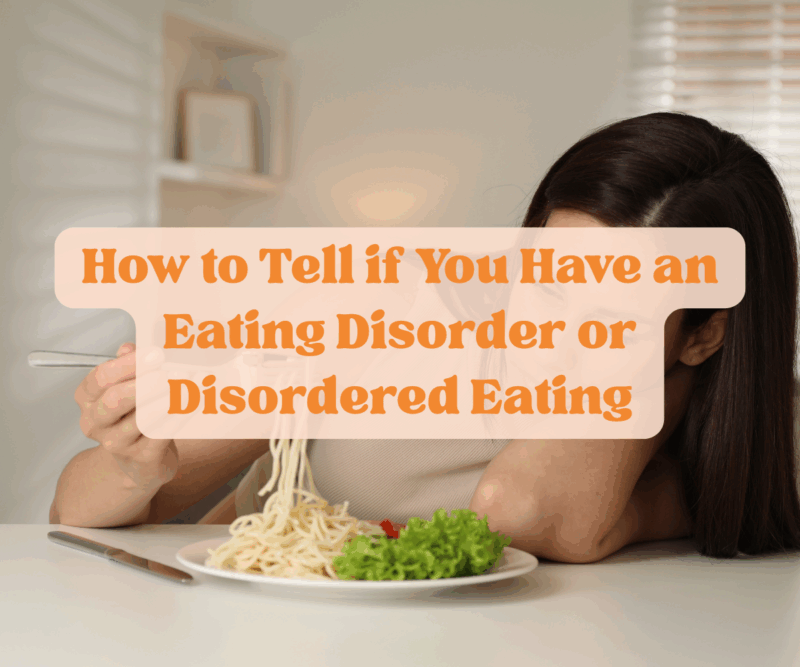How to Protect Your Eating Disorder Recovery in Prenatal Care
This post is Part 2 in my “Pregnancy and Eating Disorder Recovery” series, where we cover fertility, pregnancy triggers, medical care, and postpartum challenges.
In Part 1 of this series, we explored how eating disorders can affect fertility and what triggers often show up during pregnancy. If you haven’t read it yet, you can find it here.
This post will focus on something equally important: navigating prenatal care. From weight checks to body comments, knowing what to expect (and how to set boundaries) can help you feel more supported in recovery.
What to Expect from Prenatal Care in Eating Disorder Recovery
Prenatal care will look a little different for everyone, but for many people in eating disorder recovery, the medical side of pregnancy can feel surprisingly triggering. Frequent appointments, body measurements, weight checks, and lab work are designed to monitor your health and your baby’s development, but they can also stir up old thoughts or anxieties about control, body size, or having a “perfect” pregnancy.
In traditional prenatal care (most often with an OB-GYN), appointments typically begin once a month in early pregnancy, increasing to every two weeks in the third trimester, and weekly as you approach your due date.
Prenatal visits often include:
- Weight checks and blood pressure monitoring
- Routine urine tests
- Listening to the baby’s heartbeat
- Measuring fundal height (the growth of the uterus)
- Discussing symptoms, nutrition, and physical activity
- Occasionally, ultrasounds or bloodwork
For some, these check-ins provide reassurance. For others, the structure and focus on numbers can bring back the hyper-monitoring and external validation patterns that fueled the eating disorder in the past. It’s completely relatable to feel a mix of gratitude and anxiety in these moments.
If traditional prenatal care feels too clinical or weight-focused, you do have options. Midwifery care, birth center care, and some family practice physicians often take a more holistic, relationship-centered approach. These providers may place greater emphasis on overall well-being, emotional health, and shared decision-making. They may also be more open to discussing how to navigate weight checks or body changes in a way that supports your recovery.
Regardless of which type of care you choose, it’s your right to tailor your prenatal experience to your needs. As we’ll cover below, you can ask for blind weights, decline to discuss numbers, or request that your provider focus on functional markers of health instead of the scale. The most supportive care environments are those where your voice is valued and your recovery is respected.
Knowing the structure of prenatal care helps set expectations, but one of the biggest challenges for many in recovery is coping with the body changes and weight monitoring that are part of routine pregnancy care. Here’s how to approach them with compassion and confidence.
The role of body changes and weight monitoring
Even though pregnancy body changes and the loss of control that comes along with them can feel overwhelming, it’s important to normalize that weight gain during pregnancy is expected and healthy. Existing guidelines around pregnancy weight gain are controversial (and in my opinion, need to be more critically reviewed for the confounding effect of weight stigma).
There are a few instances where weight changes can indicate pregnancy complications, like in preeclampsia, where fluid shifts and rapid weight gain can help diagnose this dangerous condition.
In general, pregnancy weight gain is related to:
- The growing uterus
- Placenta and amniotic fluid
- The developing fetus
- Increases in blood volume
- Breast tissue
- Protein & fat stores
- Maternal body fluids

A few more notes about weight gain
It’s important to remember that not every pregnancy will follow the “recommended” trajectory of weight gain, and that’s okay. Our bodies are wise and often respond to their own unique histories. If you enter pregnancy after a period of restriction, dieting, or over-exercising, your body may be more likely to hold on to and store fat as a way to protect and nourish you and your baby. This isn’t a sign that something is wrong – it’s a sign that your body is working to restore balance and safety.
In fact, the American College of Obstetricians and Gynecologists (ACOG) recognizes that people who begin pregnancy at a lower weight may need to gain more to support a healthy pregnancy. But weight history and needs can’t be fully captured by BMI. Even if you don’t fall into the “underweight” category, your body may still be in a weight-suppressed state and need additional weight gain to fully support maternal and fetal health.
Research shows that the relationship between eating disorders and pregnancy weight gain isn’t simple or uniform. A 2025 systematic review in the Journal of Obstetrics and Gynaecology Canada found that outcomes vary depending on the type of eating disorder:
- People with anorexia nervosa were more likely to gain less than the recommended amount.
- Those with bulimia nervosa or binge eating disorder tended to experience greater weight gain than guidelines suggest.
The review identified three major themes shaping this pattern: body image concerns, fear of weight gain or postpartum weight retention, and prioritizing the baby’s health. Many participants described feeling torn between the instinct to protect their baby and the pull of long-standing fears or urges to control their body.
For those in recovery, this highlights how complex and individualized the experience of pregnancy can be.
Two people could enter pregnancy with the same diagnosis and have very different relationships to food, weight, and body changes. It also reinforces why a single set of weight gain guidelines can’t account for the full picture – especially for someone with a history of restriction, bingeing, or weight cycling.
If routine weight checks feel overwhelming, talk to your provider ahead of time. You deserve care that supports your pregnancy without compromising your recovery.
How to talk to your OB or midwife about weight checks
Weight monitoring is a common trigger for those in recovery from an eating disorder or who have a difficult relationship with body and weight. It’s essential to discuss your concerns with your prenatal providers ahead of time to protect your recovery. Don’t think you have to suffer through weight checks at every appointment and stress about weight gain through your whole pregnancy.
Weight does not necessarily need to be taken at every appointment. You can and should discuss opting out of weight checks. There are many other ways providers can track the health of your pregnancy – many of which may be more meaningful anyway!
I know it might feel intimidating to bring this up. I recommend going into your appointments with a simple script like: “I’d prefer not to know my weight during pregnancy in order to protect my mental health and eating disorder recovery. Can we track my health in other ways?”
Other options include a blind weight (stepping on the scale backwards) – just make sure you tell the person taking your weight that you don’t want to know the number. Even with a blind weight check, your weight will likely still make it into your medical chart, so access your medical records with care and support.
Consider bringing a support person who is familiar with your recovery experience to help back you up when things feel complicated. You absolutely can demand care that is not harmful for you or your baby.
Building a supportive prenatal care team in eating disorder recovery
Pregnancy is a time where you definitely don’t want to be without adequate support, especially in eating disorder recovery or if you’re worried about old thoughts and behaviors creeping back in.
Everyone’s care team may look a little different depending on individual needs and preferences. A 2025 Systematic Review in the BMC Pregnancy and Childbirth journal highlights the importance of multidisciplinary collaboration in managing eating disorders in pregnancy.
My version of an ED-Recovery pregnancy dream team looks like this:
- An OB or Midwife who is informed about eating disorders and/or open to providing sensitive care
- A birth doula who can help you feel more confident and empowered in your changing body
- A therapist trained in perinatal mental health and eating disorders
- A Health at Every Size® dietitian specialized in eating disorders (not just prenatal nutrition)
- An eating-disorders informed perinatal psychiatrist if needed
The number of appointments during pregnancy can feel overwhelming. I get it. But it’s so important to have more support than not enough. I also want to acknowledge that it’s not always possible to have all of these people on your team – whether that’s due to financial constraints, insurance issues, or simply a lack of access to qualified providers. Even having one or two providers who “get it” can make a huge difference in your prenatal care.
It’s also possible, and totally normal, to switch providers throughout your pregnancy if it doesn’t feel like a good fit. Don’t force yourself to stick with a situation that feels harmful.
Warning Signs of Relapse in Pregnancy
Even for those who feel solid in their recovery, pregnancy can bring up old thoughts and behaviors that seem to come out of nowhere. The combination of body changes, medical monitoring, and shifting routines and identity can quietly nudge you back toward old coping mechanisms before you even realize what’s happening. That’s not a sign that you’ve failed in recovery. Rather, it’s a sign that you’re human, and that you’re navigating a uniquely triggering chapter.
Behaviors and Thoughts to Watch Out For
Some early signs of relapse may feel subtle at first – things that could be easy to brush off as “just being more careful” or “trying to eat healthy for the baby.” But if you notice patterns like these, it may be time to pause and check in with your support team:
- Increasing anxiety about food or weight. Feeling preoccupied with how much you’re eating or how your body looks
- Avoiding certain foods or food groups, especially ones that previously felt “off-limits”
- Comparing your body or weight gain to others, including other pregnant people or your past pregnancies
- Feeling guilt, shame, or panic after eating, even if the meal was balanced and nourishing
- Skipping snacks or meals to “make up for” eating more earlier in the day
- Over-monitoring movement. Tracking steps, overdoing prenatal workouts, or feeling distressed when rest is needed
- Compensatory urges, such as restricting after indulgent meals or trying to “earn” food with exercise
- Avoiding medical appointments out of fear of being weighed or discussing weight changes
- Dismissing hunger cues or ignoring fullness to maintain control
If these sound familiar, it doesn’t automatically mean you’re “back at square one.” But it does mean your nervous system might be reaching for old strategies to cope with uncertainty or discomfort, and that’s your cue to bring in more support.
When to Reach Out for Help
If you find that eating disorder thoughts are taking up more of your mental energy, or that you’re starting to feel disconnected from your body or your baby, it’s time to reach out even if things “aren’t that bad yet.” Early intervention during pregnancy can make an enormous difference, both for your recovery and your overall well-being.
Reach out if:
- You notice restrictive or compensatory behaviors returning
- You’re feeling increasingly anxious about weight gain or your body
- You’ve started avoiding prenatal care or stress about discussing weight with your provider
- You’re struggling to eat consistently or meet your nutrition needs
- You feel shame, guilt, or fear around food most days
Your next step might look like contacting your therapist, dietitian, or OB/midwife and letting them know you could use some extra support right now. If you’re not currently working with a recovery-informed provider, organizations like Project HEAL, MEDA, and the Postpartum Support International (PSI) Helpline can connect you to resources and care options near you.
Remember: pregnancy is not a “test” of whether your recovery is strong enough. It’s a time when your body and mind are under more strain than usual, and needing more support doesn’t erase the progress you’ve made. Reaching out early is an act of care for both you and your baby.
Looking Ahead
Pregnancy in recovery is a big, beautiful, and often complicated journey. You don’t have to have it all figured out because your body already knows how to do so much of this work. What matters most is finding the support and steadiness you need to feel safe and cared for along the way.
In Part 3 of this series, we’ll talk about how to stay nourished and grounded through each trimester, and how to keep moving forward in recovery even when things feel uncertain.
Resources & Support
If you’re reading this and finding yourself struggling, please know you are not alone — and you don’t need to push through it by yourself.
- 📞 NEDA Helpline: Call or text 1-800-931-2237 for confidential support.
- 📱 In the U.S., you can also dial 988 to connect with the Suicide & Crisis Lifeline if you’re in immediate crisis.
- 🌍 Outside the U.S.? Find international hotlines here.
And if you’re looking for compassionate, weight-inclusive nutrition support during pregnancy, postpartum, or while trying to conceive, I’d be honored to walk alongside you. You can learn more about working with me here.





